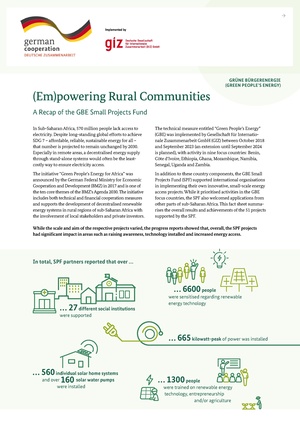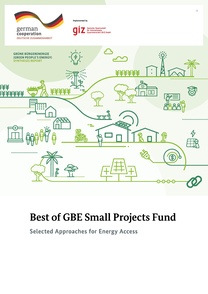As part of the Green People’s Energy for Africa initiative, the GBE Small Projects Fund (SPF) supported international organisations in implementing their own innovative, small-scale energy access projects. Between 2018 and 2024, the SPF supported 51 projects in 14 African countries (browse the map below to see details).
Over the course of three years, the SPF accepted applications from international organisations who had come up with energy access projects for rural areas in SSA. The project proposals they submitted were evaluated by a committee composed of experts from the GBE team as well as the two special representatives for energy for the German ministry BMZ. Applications were evaluated in a standardised process which assessed whether the applicants met the administrative requirements and reviewed the potential social, ecological, and economic impacts of the project idea.
In 2021 the SPF also launched the Challenge Call, a call for proposals designed to attract projects addressing one of two topics:
• Reducing CO2 emissions through energy access.
As the projects varied considerably in size and complexity, their funding was tailored to the project needs with the maximum in funding granted being 200.000€. On the project side, the applying organisations were in turn asked to provide an own contribution of 20%.
The projects selected through both the standard procedure and the Challenge Call where then accompanied by financial and technical advisors from the GBE team throughout the implementation. To track their progress, each project submitted bi-annual progress reports as well as a final report once the implementation had finished. They also documented financial allocation of funds and construction progress.
The 51 projects of the SPF covered a range of intervention areas. 75% of these projects worked on either “providing energy access” or “education and training on using solar PV” or a combination of both. This entailed awareness raising, training on installation and maintenance and installing renewable energy equipment both for energy consumption and productive use. Appliances featured included: PV for general electricity production for lighting or the cooling of vaccines, solar powered water pumps for agriculture and PUE equipment such as coffee driers.
Across all projects, over 665 kilowatt-peak were installed with the support of the SPF. Further, approximately 6600 people were reached in sensitisation campaigns and 1300 received training in business, agriculture, or solar technologies. For more details see the Overarching Factsheet of the SPF.
To find out more about the individual projects, click on the markers on the map below.
For a comprehensive, downloadable overview of the SPF, please click on the Factsheet: (Em)powering Rural Communities - A Recap of the GBE Small Projects Fund on the right.
As mentioned above, a total of 51 small scale energy projects was supported by the Small Projects Fund in cooperation with international partner organisations. To learn more about the different projects, you can use the map at the bottom or the overview table on the Measures and Projects page. You can find partner organisations, descriptions of the interventions and their impacts in the descriptions. Furthermore, you can download a comprehensive factsheet of each project.
The interventions of three SPF projects have been analysed more thoroughly for GBE Case Studies:
To make the learnings from the SPF accessible and useable for the design of similar future energy interventions, the SPF team created the Best of GBE Small Projects Fund - Selected Approaches for Energy Access report. This synthesis report decontextualises the most promising elements from individual SPF-financed projects and reframes them into more general and scalable approaches with special attention to the sustainability of the projects.
Clustered into the five sustainability categories, this compilation of approaches aims to inspire practitioners both while designing new energy access projects and when in search of a solution for a certain sustainability challenge. Each approach also provides a link to a concrete project example in the report’s appendix. The five categories are based on the FIETS (Financial, Institutional, Environmental, Technical, and Social) sustainability framework of the Dutch WASH (water, sanitation, and hygiene) Alliance. Most of the projects demonstrated particular strength in one or two of the sustainability categories.
Loading map...
{"format":"leaflet","minzoom":false,"maxzoom":false,"limit":50,"offset":0,"link":"all","sort":[""],"order":[],"headers":"show","mainlabel":"","intro":"","outro":"","searchlabel":"... further results","default":"","import-annotation":false,"width":"auto","height":"1000px","centre":{"text":"","title":"","link":"","lat":-2.9814344,"lon":23.8222636,"icon":""},"title":"","label":"","icon":"","lines":[],"polygons":[],"circles":[],"rectangles":[],"copycoords":false,"static":false,"zoom":4,"defzoom":14,"layers":["OpenStreetMap"],"image layers":[],"overlays":[],"resizable":false,"fullscreen":false,"scrollwheelzoom":true,"cluster":false,"clustermaxzoom":20,"clusterzoomonclick":true,"clustermaxradius":80,"clusterspiderfy":true,"geojson":"","clicktarget":"","showtitle":true,"hidenamespace":true,"template":"GBE SPF Map Popup","userparam":"","activeicon":"","pagelabel":false,"ajaxcoordproperty":"","ajaxquery":"","locations":[{"text":"\u003Cb\u003E\u003Ca href=\"/wiki/Access_to_Solar-Powered_Water_Pumps_in_Laikipia\" title=\"Access to Solar-Powered Water Pumps in Laikipia\"\u003EAccess to Solar-Powered Water Pumps in Laikipia\u003C/a\u003E\u003C/b\u003E\u003Cp\u003EPartner Project\n\u003C/p\u003E","title":"Access to Solar-Powered Water Pumps in Laikipia","link":"","lat":0.28585,"lon":36.82577,"icon":""},{"text":"\u003Cb\u003E\u003Ca href=\"/wiki/Agrivoltaics_for_Sustainable_Development\" title=\"Agrivoltaics for Sustainable Development\"\u003EAgrivoltaics for Sustainable Development\u003C/a\u003E\u003C/b\u003E\u003Cp\u003EPartner Project\n\u003C/p\u003E","title":"Agrivoltaics for Sustainable Development","link":"","lat":6.49959,"lon":2.61636,"icon":""},{"text":"\u003Cb\u003E\u003Ca href=\"/wiki/Biogas_Saves_Women_Time_and_Fosters_Their_Independence\" title=\"Biogas Saves Women Time and Fosters Their Independence\"\u003EBiogas Saves Women Time and Fosters Their Independence\u003C/a\u003E\u003C/b\u003E\u003Cp\u003EPartner Project\n\u003C/p\u003E","title":"Biogas Saves Women Time and Fosters Their Independence","link":"","lat":9.13827,"lon":2.59618,"icon":""},{"text":"\u003Cb\u003E\u003Ca href=\"/wiki/Capacity_Building_for_Quality_Energy_Services_in_Rural_Benin\" title=\"Capacity Building for Quality Energy Services in Rural Benin\"\u003ECapacity Building for Quality Energy Services in Rural Benin\u003C/a\u003E\u003C/b\u003E\u003Cp\u003EPartner Project\n\u003C/p\u003E","title":"Capacity Building for Quality Energy Services in Rural Benin","link":"","lat":6.46406,"lon":2.34352,"icon":""},{"text":"\u003Cb\u003E\u003Ca href=\"/wiki/Domestic_Biogas_to_Improve_Rural_Livelihood_in_Ethiopia\" title=\"Domestic Biogas to Improve Rural Livelihood in Ethiopia\"\u003EDomestic Biogas to Improve Rural Livelihood in Ethiopia\u003C/a\u003E\u003C/b\u003E\u003Cp\u003EPartner Project\n\u003C/p\u003E","title":"Domestic Biogas to Improve Rural Livelihood in Ethiopia","link":"","lat":8.99074,"lon":35.82335,"icon":""},{"text":"\u003Cb\u003E\u003Ca href=\"/wiki/E-Education:_Energy_for_Schools\" title=\"E-Education: Energy for Schools\"\u003EE-Education: Energy for Schools\u003C/a\u003E\u003C/b\u003E\u003Cp\u003EPartner Project\n\u003C/p\u003E","title":"E-Education: Energy for Schools","link":"","lat":-13.31872,"lon":32.68548,"icon":""},{"text":"\u003Cb\u003E\u003Ca href=\"/wiki/Electrification_of_the_Lake_Village_Ganvi%C3%A9_from_Floating_Photovoltaic_Sources\" title=\"Electrification of the Lake Village Ganvi\u00e9 from Floating Photovoltaic Sources\"\u003EElectrification of the Lake Village Ganvi\u00e9 from Floating Photovoltaic Sources\u003C/a\u003E\u003C/b\u003E\u003Cp\u003EPartner Project\n\u003C/p\u003E","title":"Electrification of the Lake Village Ganvi\u00e9 from Floating Photovoltaic Sources","link":"","lat":6.46792,"lon":2.38986,"icon":""},{"text":"\u003Cb\u003E\u003Ca href=\"/wiki/Enhancing_Immunizations_and_Vaccinations_Coverage_in_Moyo_District\" title=\"Enhancing Immunizations and Vaccinations Coverage in Moyo District\"\u003EEnhancing Immunizations and Vaccinations Coverage in Moyo District\u003C/a\u003E\u003C/b\u003E\u003Cp\u003EPartner Project\n\u003C/p\u003E","title":"Enhancing Immunizations and Vaccinations Coverage in Moyo District","link":"","lat":3.6591,"lon":31.75464,"icon":""},{"text":"\u003Cb\u003E\u003Ca href=\"/wiki/Enhancing_the_Role_of_Solar_Irrigation_for_Poverty_Reduction_Near_Mt._Kilimanjaro\" title=\"Enhancing the Role of Solar Irrigation for Poverty Reduction Near Mt. Kilimanjaro\"\u003EEnhancing the Role of Solar Irrigation for Poverty Reduction Near Mt. Kilimanjaro\u003C/a\u003E\u003C/b\u003E\u003Cp\u003EPartner Project\n\u003C/p\u003E","title":"Enhancing the Role of Solar Irrigation for Poverty Reduction Near Mt. Kilimanjaro","link":"","lat":-3.47628,"lon":37.38726,"icon":""},{"text":"\u003Cb\u003E\u003Ca href=\"/wiki/Extension_of_PV_Solar_Park_at_Radio_Pacis_with_230_kWp\" title=\"Extension of PV Solar Park at Radio Pacis with 230 kWp\"\u003EExtension of PV Solar Park at Radio Pacis with 230 kWp\u003C/a\u003E\u003C/b\u003E\u003Cp\u003EPartner Project\n\u003C/p\u003E","title":"Extension of PV Solar Park at Radio Pacis with 230 kWp","link":"","lat":3.01829,"lon":30.99163,"icon":""},{"text":"\u003Cb\u003E\u003Ca href=\"/wiki/Fairtrade_Inclusive_Energy_Fund\" title=\"Fairtrade Inclusive Energy Fund\"\u003EFairtrade Inclusive Energy Fund\u003C/a\u003E\u003C/b\u003E\u003Cp\u003EPartner Project\n\u003C/p\u003E","title":"Fairtrade Inclusive Energy Fund","link":"","lat":0.32444,"lon":32.58047,"icon":""},{"text":"\u003Cb\u003E\u003Ca href=\"/wiki/Foundational_Work_to_Improve_the_Energy_Supply_at_Bugendana_Socio-Pastoral_Centre\" title=\"Foundational Work to Improve the Energy Supply at Bugendana Socio-Pastoral Centre\"\u003EFoundational Work to Improve the Energy Supply at Bugendana Socio-Pastoral Centre\u003C/a\u003E\u003C/b\u003E\u003Cp\u003EPartner Project\n\u003C/p\u003E","title":"Foundational Work to Improve the Energy Supply at Bugendana Socio-Pastoral Centre","link":"","lat":-3.53891,"lon":29.91241,"icon":""},{"text":"\u003Cb\u003E\u003Ca href=\"/wiki/Harnessing_CO2_Emission_Reduction_Monitoring_to_Accelerate_EV_Adoption\" title=\"Harnessing CO2 Emission Reduction Monitoring to Accelerate EV Adoption\"\u003EHarnessing CO2 Emission Reduction Monitoring to Accelerate EV Adoption\u003C/a\u003E\u003C/b\u003E\u003Cp\u003EPartner Project\n\u003C/p\u003E","title":"Harnessing CO2 Emission Reduction Monitoring to Accelerate EV Adoption","link":"","lat":0.31771,"lon":32.58135,"icon":""},{"text":"\u003Cb\u003E\u003Ca href=\"/wiki/Improvement_of_Milk_Storage_Using_Solar_Powered_Coolers\" title=\"Improvement of Milk Storage Using Solar Powered Coolers\"\u003EImprovement of Milk Storage Using Solar Powered Coolers\u003C/a\u003E\u003C/b\u003E\u003Cp\u003EPartner Project\n\u003C/p\u003E","title":"Improvement of Milk Storage Using Solar Powered Coolers","link":"","lat":-17.78779,"lon":25.27602,"icon":""},{"text":"\u003Cb\u003E\u003Ca href=\"/wiki/Increased_Access_to_Solar_Energy_for_the_Medical_Centres_in_Rural_Areas_of_South_Kivu\" title=\"Increased Access to Solar Energy for the Medical Centres in Rural Areas of South Kivu\"\u003EIncreased Access to Solar Energy for the Medical Centres in Rural Areas of South Kivu\u003C/a\u003E\u003C/b\u003E\u003Cp\u003EPartner Project\n\u003C/p\u003E","title":"Increased Access to Solar Energy for the Medical Centres in Rural Areas of South Kivu","link":"","lat":-3.36821,"lon":27.98495,"icon":""},{"text":"\u003Cb\u003E\u003Ca href=\"/wiki/Increasing_Access_to_Clean_Energy_and_Microfinance_Products_for_Small-Producer_Organisations\" title=\"Increasing Access to Clean Energy and Microfinance Products for Small-Producer Organisations\"\u003EIncreasing Access to Clean Energy and Microfinance Products for Small-Producer Organisations\u003C/a\u003E\u003C/b\u003E\u003Cp\u003EPartner Project\n\u003C/p\u003E","title":"Increasing Access to Clean Energy and Microfinance Products for Small-Producer Organisations","link":"","lat":-0.12672,"lon":31.62185,"icon":""},{"text":"\u003Cb\u003E\u003Ca href=\"/wiki/Integrated_Project_for_the_Development_of_Local_Skills\" title=\"Integrated Project for the Development of Local Skills\"\u003EIntegrated Project for the Development of Local Skills\u003C/a\u003E\u003C/b\u003E\u003Cp\u003EPartner Project\n\u003C/p\u003E","title":"Integrated Project for the Development of Local Skills","link":"","lat":14.7944,"lon":-16.92745,"icon":""},{"text":"\u003Cb\u003E\u003Ca href=\"/wiki/Maa_Green_Energy_Project\" title=\"Maa Green Energy Project\"\u003EMaa Green Energy Project\u003C/a\u003E\u003C/b\u003E\u003Cp\u003EPartner Project\n\u003C/p\u003E","title":"Maa Green Energy Project","link":"","lat":-2.12172,"lon":36.78626,"icon":""},{"text":"\u003Cb\u003E\u003Ca href=\"/wiki/Public-Private_Partnerships_for_Solar_Energy_Projects_in_Benin\" title=\"Public-Private Partnerships for Solar Energy Projects in Benin\"\u003EPublic-Private Partnerships for Solar Energy Projects in Benin\u003C/a\u003E\u003C/b\u003E\u003Cp\u003EPartner Project\n\u003C/p\u003E","title":"Public-Private Partnerships for Solar Energy Projects in Benin","link":"","lat":6.51096,"lon":2.33031,"icon":""},{"text":"\u003Cb\u003E\u003Ca href=\"/wiki/Reliable_Electrification_Through_Solar_Mini-Grid_and_Business_Promotion\" title=\"Reliable Electrification Through Solar Mini-Grid and Business Promotion\"\u003EReliable Electrification Through Solar Mini-Grid and Business Promotion\u003C/a\u003E\u003C/b\u003E\u003Cp\u003EPartner Project\n\u003C/p\u003E","title":"Reliable Electrification Through Solar Mini-Grid and Business Promotion","link":"","lat":14.18149,"lon":-12.71516,"icon":""},{"text":"\u003Cb\u003E\u003Ca href=\"/wiki/Renewable_Energy_for_Agriculture\" title=\"Renewable Energy for Agriculture\"\u003ERenewable Energy for Agriculture\u003C/a\u003E\u003C/b\u003E\u003Cp\u003EPartner Project\n\u003C/p\u003E","title":"Renewable Energy for Agriculture","link":"","lat":-11.83138,"lon":34.1693,"icon":""},{"text":"\u003Cb\u003E\u003Ca href=\"/wiki/Renewable_Energy_for_Marginalised_Communities\" title=\"Renewable Energy for Marginalised Communities\"\u003ERenewable Energy for Marginalised Communities\u003C/a\u003E\u003C/b\u003E\u003Cp\u003EPartner Project\n\u003C/p\u003E","title":"Renewable Energy for Marginalised Communities","link":"","lat":-22.38975,"lon":18.61851,"icon":""},{"text":"\u003Cb\u003E\u003Ca href=\"/wiki/SOLARED_Coffee_Project\" title=\"SOLARED Coffee Project\"\u003ESOLARED Coffee Project\u003C/a\u003E\u003C/b\u003E\u003Cp\u003EPartner Project\n\u003C/p\u003E","title":"SOLARED Coffee Project","link":"","lat":-0.32471,"lon":36.92976,"icon":""},{"text":"\u003Cb\u003E\u003Ca href=\"/wiki/Securing_Health_Care_with_Solar_Power\" title=\"Securing Health Care with Solar Power\"\u003ESecuring Health Care with Solar Power\u003C/a\u003E\u003C/b\u003E\u003Cp\u003EPartner Project\n\u003C/p\u003E","title":"Securing Health Care with Solar Power","link":"","lat":0.31628,"lon":32.58219,"icon":""},{"text":"\u003Cb\u003E\u003Ca href=\"/wiki/Solar_Boost_4_a_Sustainable_Future\" title=\"Solar Boost 4 a Sustainable Future\"\u003ESolar Boost 4 a Sustainable Future\u003C/a\u003E\u003C/b\u003E\u003Cp\u003EPartner Project\n\u003C/p\u003E","title":"Solar Boost 4 a Sustainable Future","link":"","lat":-20.46358,"lon":16.6491,"icon":""},{"text":"\u003Cb\u003E\u003Ca href=\"/wiki/Solar_Energy_for_Eye_Care\" title=\"Solar Energy for Eye Care\"\u003ESolar Energy for Eye Care\u003C/a\u003E\u003C/b\u003E\u003Cp\u003EPartner Project\n\u003C/p\u003E","title":"Solar Energy for Eye Care","link":"","lat":4.02411,"lon":11.38148,"icon":""},{"text":"\u003Cb\u003E\u003Ca href=\"/wiki/Solar_PV_System_and_Training_at_%C2%BBCasa_do_Gaiato%C2%AB_Orphanage\" title=\"Solar PV System and Training at \u00bbCasa do Gaiato\u00ab Orphanage\"\u003ESolar PV System and Training at \u00bbCasa do Gaiato\u00ab Orphanage\u003C/a\u003E\u003C/b\u003E\u003Cp\u003EPartner Project\n\u003C/p\u003E","title":"Solar PV System and Training at \u00bbCasa do Gaiato\u00ab Orphanage","link":"","lat":-26.0429,"lon":32.32899,"icon":""},{"text":"\u003Cb\u003E\u003Ca href=\"/wiki/Solar_Power_Lights_Up_a_Village_and_Enables_Productive_Use\" title=\"Solar Power Lights Up a Village and Enables Productive Use\"\u003ESolar Power Lights Up a Village and Enables Productive Use\u003C/a\u003E\u003C/b\u003E\u003Cp\u003EPartner Project\n\u003C/p\u003E","title":"Solar Power Lights Up a Village and Enables Productive Use","link":"","lat":6.57507,"lon":2.60994,"icon":""},{"text":"\u003Cb\u003E\u003Ca href=\"/wiki/Solar_Power_for_Hai_Vocational_Training_Centre\" title=\"Solar Power for Hai Vocational Training Centre\"\u003ESolar Power for Hai Vocational Training Centre\u003C/a\u003E\u003C/b\u003E\u003Cp\u003EPartner Project\n\u003C/p\u003E","title":"Solar Power for Hai Vocational Training Centre","link":"","lat":-3.31215,"lon":37.15824,"icon":""},{"text":"\u003Cb\u003E\u003Ca href=\"/wiki/Solar_Project_for_CoRSU_Hospital\" title=\"Solar Project for CoRSU Hospital\"\u003ESolar Project for CoRSU Hospital\u003C/a\u003E\u003C/b\u003E\u003Cp\u003EPartner Project\n\u003C/p\u003E","title":"Solar Project for CoRSU Hospital","link":"","lat":0.39877,"lon":32.47799,"icon":""},{"text":"\u003Cb\u003E\u003Ca href=\"/wiki/Solar_Pumping_System_for_Women_Farmers\" title=\"Solar Pumping System for Women Farmers\"\u003ESolar Pumping System for Women Farmers\u003C/a\u003E\u003C/b\u003E\u003Cp\u003EPartner Project\n\u003C/p\u003E","title":"Solar Pumping System for Women Farmers","link":"","lat":16.65271,"lon":-14.95867,"icon":""},{"text":"\u003Cb\u003E\u003Ca href=\"/wiki/Solar_Saver:_Second_Generation_Lights\" title=\"Solar Saver: Second Generation Lights\"\u003ESolar Saver: Second Generation Lights\u003C/a\u003E\u003C/b\u003E\u003Cp\u003EPartner Project\n\u003C/p\u003E","title":"Solar Saver: Second Generation Lights","link":"","lat":-13.9695,"lon":28.6788,"icon":""},{"text":"\u003Cb\u003E\u003Ca href=\"/wiki/Solar_Solutions_for_Refugees_and_Host_Communities\" title=\"Solar Solutions for Refugees and Host Communities\"\u003ESolar Solutions for Refugees and Host Communities\u003C/a\u003E\u003C/b\u003E\u003Cp\u003EPartner Project\n\u003C/p\u003E","title":"Solar Solutions for Refugees and Host Communities","link":"","lat":3.10117,"lon":31.32671,"icon":""},{"text":"\u003Cb\u003E\u003Ca href=\"/wiki/Solar_Training_%26_Entrepreneurship\" title=\"Solar Training \u0026amp; Entrepreneurship\"\u003ESolar Training \u0026 Entrepreneurship\u003C/a\u003E\u003C/b\u003E\u003Cp\u003EPartner Project\n\u003C/p\u003E","title":"Solar Training \u0026 Entrepreneurship","link":"","lat":0.31628,"lon":32.58219,"icon":""},{"text":"\u003Cb\u003E\u003Ca href=\"/wiki/Solar_Water_Heaters_for_the_Healthcare_Sector\" title=\"Solar Water Heaters for the Healthcare Sector\"\u003ESolar Water Heaters for the Healthcare Sector\u003C/a\u003E\u003C/b\u003E\u003Cp\u003EPartner Project\n\u003C/p\u003E","title":"Solar Water Heaters for the Healthcare Sector","link":"","lat":6.51096,"lon":2.33031,"icon":""},{"text":"\u003Cb\u003E\u003Ca href=\"/wiki/Solar_for_Health_Project_(S4H)\" title=\"Solar for Health Project (S4H)\"\u003ESolar for Health Project (S4H)\u003C/a\u003E\u003C/b\u003E\u003Cp\u003EPartner Project\n\u003C/p\u003E","title":"Solar for Health Project (S4H)","link":"","lat":-0.05379,"lon":31.40947,"icon":""},{"text":"\u003Cb\u003E\u003Ca href=\"/wiki/Solar_for_Improved_Rural_Health_Systems\" title=\"Solar for Improved Rural Health Systems\"\u003ESolar for Improved Rural Health Systems\u003C/a\u003E\u003C/b\u003E\u003Cp\u003EPartner Project\n\u003C/p\u003E","title":"Solar for Improved Rural Health Systems","link":"","lat":-17.78779,"lon":25.27602,"icon":""},{"text":"\u003Cb\u003E\u003Ca href=\"/wiki/SolarCent\" title=\"SolarCent\"\u003ESolarCent\u003C/a\u003E\u003C/b\u003E\u003Cp\u003EPartner Project\n\u003C/p\u003E","title":"SolarCent","link":"","lat":-24.62464,"lon":17.96267,"icon":""},{"text":"\u003Cb\u003E\u003Ca href=\"/wiki/Strengthen_Sendea:_An_innovative_cooperative_of_local_solar_SME_for_energy_access\" title=\"Strengthen Sendea: An innovative cooperative of local solar SME for energy access\"\u003EStrengthen Sendea: An innovative cooperative of local solar SME for energy access\u003C/a\u003E\u003C/b\u003E\u003Cp\u003EPartner Project\n\u003C/p\u003E","title":"Strengthen Sendea: An innovative cooperative of local solar SME for energy access","link":"","lat":0.31649,"lon":32.5821,"icon":""},{"text":"\u003Cb\u003E\u003Ca href=\"/wiki/Strengthening_Solar_PV_Education_%26_Solar_PV_Popularization_in_Rural_Villages_of_Ethiopia\" title=\"Strengthening Solar PV Education \u0026amp; Solar PV Popularization in Rural Villages of Ethiopia\"\u003EStrengthening Solar PV Education \u0026 Solar PV Popularization in Rural Villages of Ethiopia\u003C/a\u003E\u003C/b\u003E\u003Cp\u003EPartner Project\n\u003C/p\u003E","title":"Strengthening Solar PV Education \u0026 Solar PV Popularization in Rural Villages of Ethiopia","link":"","lat":6.65033,"lon":38.46931,"icon":""},{"text":"\u003Cb\u003E\u003Ca href=\"/wiki/Traineeships_for_Young_Women_Engineers_in_Benin%E2%80%99s_Public_Energy_Sector\" title=\"Traineeships for Young Women Engineers in Benin\u2019s Public Energy Sector\"\u003ETraineeships for Young Women Engineers in Benin\u2019s Public Energy Sector\u003C/a\u003E\u003C/b\u003E\u003Cp\u003EPartner Project\n\u003C/p\u003E","title":"Traineeships for Young Women Engineers in Benin\u2019s Public Energy Sector","link":"","lat":6.44487,"lon":2.63397,"icon":""},{"text":"\u003Cb\u003E\u003Ca href=\"/wiki/Tukole_Solar_Project\" title=\"Tukole Solar Project\"\u003ETukole Solar Project\u003C/a\u003E\u003C/b\u003E\u003Cp\u003EPartner Project\n\u003C/p\u003E","title":"Tukole Solar Project","link":"","lat":0.31771,"lon":32.58135,"icon":""},{"text":"\u003Cb\u003E\u003Ca href=\"/wiki/Understanding_the_CO2_Footprint_of_PV_Installations\" title=\"Understanding the CO2 Footprint of PV Installations\"\u003EUnderstanding the CO2 Footprint of PV Installations\u003C/a\u003E\u003C/b\u003E\u003Cp\u003EPartner Project\n\u003C/p\u003E","title":"Understanding the CO2 Footprint of PV Installations","link":"","lat":3.86899,"lon":11.52133,"icon":""},{"text":"\u003Cb\u003E\u003Ca href=\"/wiki/Using_Water_Hyacinth_Blend_for_Biogas_and_Fertilizer_Production\" title=\"Using Water Hyacinth Blend for Biogas and Fertilizer Production\"\u003EUsing Water Hyacinth Blend for Biogas and Fertilizer Production\u003C/a\u003E\u003C/b\u003E\u003Cp\u003EPartner Project\n\u003C/p\u003E","title":"Using Water Hyacinth Blend for Biogas and Fertilizer Production","link":"","lat":7.67216,"lon":40.02997,"icon":""},{"text":"\u003Cb\u003E\u003Ca href=\"/wiki/Women_and_Youths_Take_Off\" title=\"Women and Youths Take Off\"\u003EWomen and Youths Take Off\u003C/a\u003E\u003C/b\u003E\u003Cp\u003EPartner Project\n\u003C/p\u003E","title":"Women and Youths Take Off","link":"","lat":15.00288,"lon":-13.92401,"icon":""}],"imageLayers":[]}





















